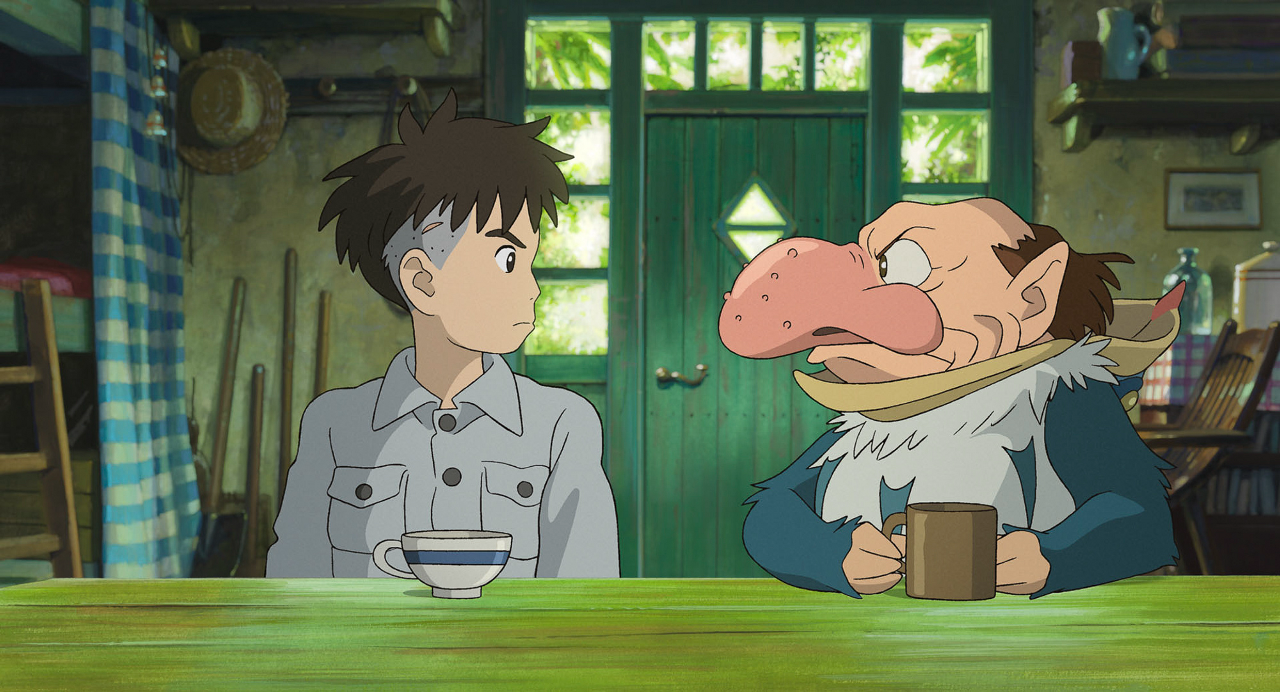The Boy and the Heron
Rating
![]()
Director
Hayao Miyazaki
Screenplay
Hayao Miyazaki
Length
2h 04m
Starring
Soma Santoki, Masaki Suda, Kou Shibasaki, Aimyon, Yoshino Kimura, Takuya Kimura
MPAA Rating
PG-13
Original Preview
Review
Japanese culture and spiritually have always provided a potent well from which Hayao Miyazaki draws his filmic inspiration. The Boy and the Heron is no different and returns him to the fantastical roots that made films like Spirited Away and Princess Mononoke such successes.
Young Mahito (Soma Santoki) awakens to burnt embers on the wind and scrambling villagers rushing to a burning hospital where his mother works. Forbidden from helping, Mahito nevertheless rushes to her aid only to arrive too late. Not long thereafter, his father Shoichi (Takuya Kimura) marries his late wife’s sister Natsuko (Yoshino Kimura) and they relocate to Natsuko’s family estate. Wanting nothing but to be isolated in his pain, he injures himself and while recuperating at home discovers a grey heron who leads him to an abandoned tower built by Natsuko’s grand uncle.
The heron (Masaki Suda) eventually speaks to Mahito tempting him into the tower by promises of taking him to his mother. It isn’t until Nakuto mysteriously wanders into the woods that Mahito instinctively knows that she has been drawn to the tower perhaps to do to her what was done to his mother or to tempt him there. Against the caution of his elderly companion, he enters the tower in hopes of finding and rescuing his mother and a pregnant Natsuko.
Miyazaki’s films have always drawn on Japanese symbolism, ideas of spiritual realms, death, and the protagonist’s coming of age. This film diverts from reality fairly quickly and embraces its fantastical elements to tell a story not too dissimilar from Spirited Away, a film considered to be his best. While the heron’s cultural significance is more mysterious than other animals in Japanese history, it is no less cosmically tied, often representing spirits, gods, and death as well as paths to other worlds.
While the heron is presented in many scenes of the film in its graceful and beautiful form, the bird’s guise slips into that of a large-nosed humanoid who is graceless and coarse, a diametrically opposed personality to the serene symbolism of the heron. It’s in these moments that Miyazaki plays with the mysterious nature of the heron, its grim tidings and its connection to otherworldliness. He embraces those dichotomies to fuel his tale of a boy coming of age as he comes to grip with the loss of his mother and the bleakness of an uncertain future.
Miyazaki’s films are always some of the most gorgeous art pieces ever committed to celluloid. He exhibits grace and fluidity like that of a heron take flight. He glides through the material with ease and that’s what makes a film like The Boy and the Heron so involving. Yet, the comparison to Spirited Away is not just thematic. Much of the film follows a similar narrative trajectory, using beats and frames that feel too familiar. While the stories and the foundations to them are decidedly different, they are figurative spiritual siblings, which may be why the film feels a bit too mundane.
There is no question that Miyazaki is working at the height of his craft and The Boy and the Heron is a wonderful overall experience. What may help it work better for some than others is that feeling of déjà-vu, which may also make it a feel like coming home to a place you love visiting no matter how weather-worn it might be.
Oscar Prospects
Guarantees: Animated Feature
Potentials: Original Score
Review Written
January 17, 2024



















Leave a Reply